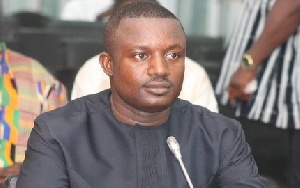 Dep. Minister of Power, John Jinapor
Dep. Minister of Power, John Jinapor
The government has served notice that electricity tariffs would be increased when the power barges being constructed in Turkey as part of efforts to boost the energy situation are brought to the country in October.
The Deputy Minister of Power, Mr John Jinapor, who announced this at the opening of the 29th Biennial Conference of Ghana Science Association in Tamale on Tuesday, said it does not make economic sense to continue to subsidise electricity when the cost of production keeps rising.
The three-day conference was to enable members of Ghana Science Association, which brought together energy experts and technologists amongst other stakeholders, to deliberate on the current energy crisis facing the country to come up with alternatives to improve the situation.
The conference is on the theme: “Harnessing Alternative Sources of Energy for National Development: Science and Technology to the Rescue.”
Mr Jinapor said there is the need for consumers to pay realistic tariffs for electricity to ensure the availability of resources to meet the rising cost of production hence the decision to withdraw subsidies on electricity.
He said government’s new policy direction is to promote solar and other renewable sources of energy as a means of diversifying energy sources to avoid overreliance on hydro energy generation, which has become expensive.
He, therefore, appealed to the private sector to partner with government in its efforts to promote solar and other renewable energies as cheap sources of energy in the country.
He called on the scientific community in the country to get involved in the discussion to harness coal as a source of energy for the country.
Dr Victor Agyemang, Director-General of the Council for Scientific and Industrial Research, underscored the importance of science and technology in the development of the country.
He called for increased investments in the sector to address the country’s various challenges including energy.
Professor Herbert Dei, Honorary President of Ghana Science Association, said the conference was to draw government’s attention to alternative sources of energy such as solar, wind, nuclear and biomass that could be harnessed for sustainable energy production in the country.
Prof Haruna Yakubu, Vice-Chancellor of the University for Development Studies, who chaired the opening ceremony, lauded the National Development Planning Commission’s efforts in coming out with a forty-year development plan for the country.
Prof Yakubu said: “This is laudable and must be encouraged since development and investment in the energy sector need long term planning and financing.”